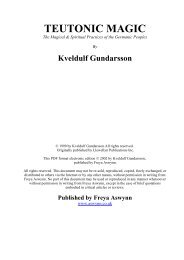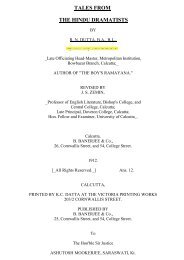Untitled - Awaken Video
Untitled - Awaken Video
Untitled - Awaken Video
Create successful ePaper yourself
Turn your PDF publications into a flip-book with our unique Google optimized e-Paper software.
Chapter 6. The Sky 160<br />
The poems in the Elder Edda describe many exploits of the Gods but very few of<br />
these have anything to do with individuals. Óðínn, the chief of the Æsir, does interfere<br />
with the lives of individuals but mostly as warriors, and He was not generally<br />
trusted to act on the behalf of the individual so much as to gain worthy, well-tested<br />
warriors and battle-chiefs for his band of Einherjar in preparation for the Battle at<br />
the End of Time. The Viking Age was a turbulent time and it must often been seen<br />
what unlikely chances swayed the outcome of battle. The unpredictable in war was<br />
attributed to Óðínn, the fickle God who had his favorites but did not keep them<br />
forever: He was openly regarded as One whose oath could not be trusted. Poets and<br />
thinkers in the tenth century found an answer presented by Óðínn’s unpredictability.<br />
There was one event that Óðínn could foresee but not prevent: the destined threat<br />
to the order of Yggdrasil maintained by the Gods, like the destined death of every<br />
individual, was bound to come. The monsters kept at bay were only biding their<br />
time and their attack was in real prospect. In the poem called the “Eiríksmál,”<br />
composed sometime after 950 CE, Óðínn in Valhalla<br />
“is asked why he deprived King Eirík of victory, seeing He thought him<br />
valiant: ’Because it is hard to know for certain,’ said Óðínn–’the gray wolf<br />
looks at the home of the Gods.’ So Óðínn gathers dead warriors and the<br />
cream of men–bitter and unjust their defeat–because He must collect His<br />
host for battle.” 26<br />
Foote and Wilson obviously consider the above statement to be an excuse created<br />
by the “thinkers of the tenth century” for the impersonal actions of Óðínn taken<br />
towards individuals in battle apparently basing their opinion on the age of the<br />
poem the “Eiríksmál.” However, it is not so improbable that the belief existed long<br />
before the 10th century and did not only pertain to Óðínn.<br />
The nature of worship of the Gods in pre-Christian times appears to have been<br />
primarily communal although there probably were certain rites conducted by families<br />
to bring favor and fertility to the land-holding. Families were more likely to<br />
invoke the aid of more localized deities rather than of the Æsir and Vanir, however<br />
(see Chap. 3 for the relationship between the Vanir and the álfar). There is no clear<br />
evidence in any of the eddaic or sagaic literature that any of the Gods were ever<br />
viewed as being “personal saviors” in the sense that Jesus is thought to be. Certain<br />
members within a community were considered both by themselves and by the other<br />
members of the community to be “the friend” of a particular God as mentioned<br />
earlier, but this relationship between a man or a woman and a God appears to<br />
have been more like that between a king and a royal representative to a region of<br />
26 Foote, P. G. and D. M. Wilson The Viking Achievement, ( Sidgwick & Jackson, Great<br />
Civilization Series; London, UK) 1970, p. 391.
















